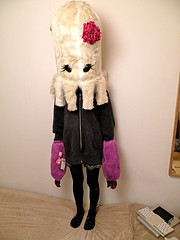This article originally appeared on Geek Feminism.
This is an Ask a Geek Feminist question:
This a “what should we do” question, but a fairly specific one.
Recent discussions, particularly Restore meritocracy in CS using an obscure functional language , have left me thinking “this still doesn’t say what it would be helpful for people like me (white male with computing experience starting early) to actually do about it”. Just saying to avoid the viewpoint that this reflects enthusiasm or innate ability isn’t very specific, but the discussion seemed to finish around that point.
The answers will probably be different in different contexts. For example, how about in class? The best I can think of is “don’t be eager to answer the lecturer’s questions to the class, but let someone else go first”. Would that help? Is that enough, in that context? But if you give the lecturer the impression you’re not knowledgeable, but then do well in the written exam, you can invite suspicion of cheating in the exam (this definitely happens). Or should you even make deliberate wrong answers, to lower your apparent expertise? I’d find that horribly condescending if I knew someone was doing it towards me.
And in a professional context, if you know the answer to a colleague’s question (or on a mailing list, to any question), but you hold back on it to let someone else answer, you’re holding back the asker from getting on with whatever raised the question. But is that less important than letting others answer? (I suspect it depends on the group or list concerned.)
And a branch of that one, relevant in my present job, in which part of my role in the team is specifically to be the experienced programmer who can answer people’s questions, how is it best to handle that?
And in a seminar, should you hold back in a discussion if you have advanced ideas, so as not to scare the less confident? But then, you’re not making your best technical contribution.
The most extreme suggestion I’ve seen (only once, I think) is that geeky men should get out of computing altogether, to make it more comfortable for others to get in. In which case, a big source of potential mentors would be lost.
And do the same suggestions apply to female experts?
So, I’m stumped on this and can’t contribute any significant answers, but I hope the questions are useful for discussion.
There was some discussion among the cob-loggers about whether and how to answer this question. But there was always lots of confusion about this on the LinuxChix lists while I was subscribed (I haven’t been for a few years now), men who genuinely wanted to in some way to address gender issues in computing but the only strength they saW in themselves was their expertise, and when it was suggested to them that displaying this at every opportunity was at best annoying and at worst harmful they were completely at a loss. So I think an answer is genuinely useful.
Important note: this answer is aimed at privileged people (in this context, generally men with a good technical background) hoping to check their privilege and keep it on a short leash. If you are a woman reading this, it’s entirely possible the reverse applies to you in geeky environments: you might be wanting to learn how to have more confidence in your expertise and how to inspire confidence in others. Some of these techniques might be useful to you at some times when you want to help others learn, but this answer isn’t really intended for you.
Important note 2: from here on, “you” refers to the general you, the person who want to encourage/support/etc women but is struggling to see how to do it without being dishonest about your own abilities, not necessarily “you” the person who asked this specific question. I’ve seen this a lot, so I want to try and address it in general. I’m generally going to assume that the relative expertise of the question asker is in fact a correct assessment but you should question whether you are really the expert or whether you’re partly benefiting from structural assumptions that you are.
Let me start by stating that there are at best misguided versions of this question: people who say “I want to share my expertise with women who want to get into computing! But now I’m not supposed to be intimidating. Fine then, I’ll take my expertise and go home. See how you like that, women in computing! Ahahahaha!” Don’t be one of those people. Your participation in technical and geeky groups, especially groups for learners, isn’t solely about you. If you insist on either being the top dog expert or going home… go home.
My beta reader for this suggested that much of the question is based around the assumption that in order to help build people up, you have to drag yourself down. There’s two problems with this: one is that this sort of thing isn’t a zero sum game, and the other is that not all women (or outsiders in general) are also beginners. They may be intimidated in spite of substantial ability and experience. So in many cases your role is less to try and hide your own excessive light under a bushel, and more to support the discovery of what’s already there.
When you’re the expert at work
In terms of your workplace, an approach I like is one that some activist groups make explicit: if you are the only person who knows how to do something that the organisation needs, you should make it your top priority to train at least one other person to do it. You could do some of the following:
- presumably part of your role as designated expert, or something that you can make part of your role, is keeping a sort of list (mental or physical) of areas of expertise other programmers have, and referring questions to the other experts.
- if something should be documented, ask the person who consults you if she can document it as she learns it. Then you can refer future questioners to that documentation, or get them to improve it. And you can credit its authors when you point people to it. And by having people teach others and write for others, you are turning them into experts.
- if something should be automated (for example, you are consulting on a fiddly manual process) ask the person who consults you if she can automate it as she learns it.
- when you get too busy (and this sounds like the sort of role where you are constantly in more demand than you can satisfy) decide that someone else needs to be the expert on some subset of the organisations knowledge base, and come up with some kind of handover process in collaboration with her, so that she is confident in being able to handle that set of problems and people know to go to her without even involving you.
- consider that your own expertise is unlikely to be all-encompassing. If there’s a task that takes you half a day and a colleague half an hour, ask her for her help with it. (No need to go on and on about how she’s the expert here yay for her, just get her help.)
Note that those aren’t specific to women colleagues despite my choice of pronoun. The idea is to change the environment such that expertise is being built everywhere, not to go out of your way to make women into experts, unless you are in an environment specifically focussed on women (like LinuxChix is).
Similarly, in teaching roles, it is important to know when someone is thinking out loud on their way to the answer and when they are genuinely stumped and starting to get too frustrated to make progress. In the former case, just let them think and give them some time to put those thoughts into action.
When you’re the expert in class
Some of the question about classroom behaviour does seem a little excessively fearful. I guess there might be some classes that are structured as lectures and a final exam, but all my classes at university involved submitted assignments throughout the course in which you can demonstrate knowledge without taking up class time. A class in which people must ask questions to demonstrate their knowledge, as opposed to asking questions because they need the answer sounds like it must be terribly tedious for everyone involved. And they must be awfully small classes, or really long ones, if everyone who doesn’t regularly participate but still does well in the class is then investigated for cheating. In general, if you are required to demonstrate expertise solely in order to pass, see if you can do so in a way that isn’t public.
In terms of being part of classes or seminars, it is situation dependent. Is the class or seminar or discussion a bit introductory for you? Perhaps you should absent yourself or remain silent while the others get the hang of things, or at least wait for one-on-one approaches from other students for help rather than taking up teaching time demonstrating your knowledge. Is it genuinely challenging for you too? Well, make it visible that you’re being challenged. Be that wonderful person who asks the lecturer half way through the class “uh, I don’t think I really understood that first set of hypotheses, can we slow up?” when everyone else thought it was just them. Throw a few ideas against the wall before you think you have the answer. If someone else has a good idea, give them space to express it, thank them, and then see if you can extend it, especially in a collaborative way with the original proposer. Watch the tendency to try and set up a you-and-me-the-smart-ones dynamic with the teacher by speaking up only when you’re totally confident.
It may help periodically to actually try and measure (by making notes of who speaks when, assuming you can do it subtly) whether you are the most talkative person in the class. If you are, take a break from talking: it’s unlikely your ideas are so uniformly superior as to need that much airtime, and if they are, perhaps you need a more advanced class.
My beta reader also suggests that if you find a classroom is centred around you and other confident students and generally being a little self-congratulatory and that other students are floundering and suffering, that perhaps you should have a word to the teacher about how you feel the classroom environment is letting most of the students down.
When you’re the expert in a women-centred geek forum
In situations like mailing lists, at least places like LinuxChix which have a specific mission to be encouraging and a good place for learning, here’s some tips:
- Have a look at the average turnaround time of the discussion. Is it common for someone to wait 24 hours to have a question answered? Well, people asking for help are probably aware that they may need to wait 24 hours (unless of course they say something like “ARGH HELP NOW DON’T DELAY FIRE FIRE FIRE IN THE THEATRE”). So make that your delay. Wait 24 hours (say), and see if they got a decent answer yet. If not, then post.
- Very important: before you post an answer, read the other answers. It’s a common problem to have a self-appointed expert insist on re-explaining the whole thing from scratch, rather than seeing that Suzy already sorted out Jane’s compile error, so you just need to help Jane work out how to get the info she needs out of the core dump.
- If an answer worked, but is missing a nuance, or isn’t precisely how you would have done it, consider carefully if you need to point that out. Is it actually harmful in the long run to do it the other suggested way or is it a matter of taste? Is this a good time and place to evangelise on matters of taste? It usually isn’t.
Note that none of this is denying your interest, expertise or talent: it’s not about pretending not to have it, it’s about genuinely putting it at the service of other people, and about developing similar expertise in other people.
I think it’s also important to interrogate your motivations in being the expert in women-centred groups. All of these approaches are not uncommon in tech groups with a lot of women:
- assumptions that you, a man, must surely be the only expert in such-and-such who is part of the group, because, really, how likely is a woman to be a such-and-such expert? (There were certainly subscribers to the LinuxChix lists who believed that this was true of all of Linux systems administration, to the constant chagrin of women members who had spent 20 years in the field.)
- assumptions that women geeks, unlike men geeks, will properly acknowledge you and respect you for your expertise, finally, the admiration you deserve!
- the good ol’ not having enough women in your social circle thing, and being there to make friends.
The last one is tricky: here’s my take. Nothing wrong with having friends or wanting more! But, when you aren’t in a social group, attend to the mission of the group first, and the socialising a distant second.




